Melbourne Montessori College: The school with few rules where children are excelling
At Melbourne Montessori College, uniforms don’t exist, teachers go by their first names and students can take a break when they like — and the school is succeeding.
Education
Don't miss out on the headlines from Education. Followed categories will be added to My News.
Nestled in Melbourne’s leafy southeast is a school where there are few rules.
Uniforms don’t exist, students can take breaks as they need and teachers are called by their first names.
There’s a functional kitchen in every classroom, a cafe where students and their educators can mingle and children from different age groups work together in one learning space.
Not even a recess bell exists with students encouraged to complete tasks at their own pace.
While this environment may sound like a university or workplace, this is the reality for students studying at Melbourne Montessori College.
The only conditions are students need to be respectful of others, responsible and have a love of learning.
The Sunday Herald Sun visited the school’s bustling Brighton Campus on Hawthorn Rd, where the once neighbouring Uniting Church is now a centrepiece of the schoolyard.
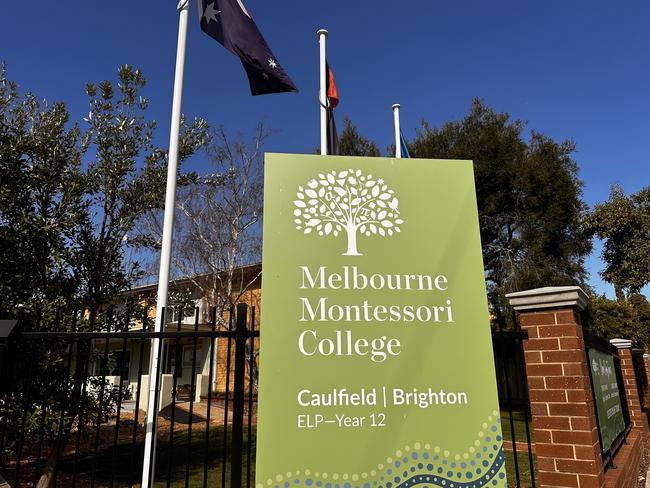
Inside the classroom, rows of desks don’t exist. Instead there’s no more than four chairs per table, giving children the freedom to move around freely.
Students learn at their own pace and follow their individual interests rather than following a set curriculum in teacher-led classes under a time limit.
The school also offers sporting facilities including a soccer pitch and basketball courts, a robotics lab and a veggie patch where students can grow vegetables and herbs they later cook with.
The school also has a second campus on Roselea St in Caulfield South.
Principal Daniel Thomas said the Montessori philosophy was all about “following the child”.
“The child is so important in regards to anything we do at Melbourne Montessori College,” he said.
“It ensures we capture and create an engaging learning environment for our students.”
Montessori education is the brainchild of Italian physician, educator and innovator Maria Montessori.
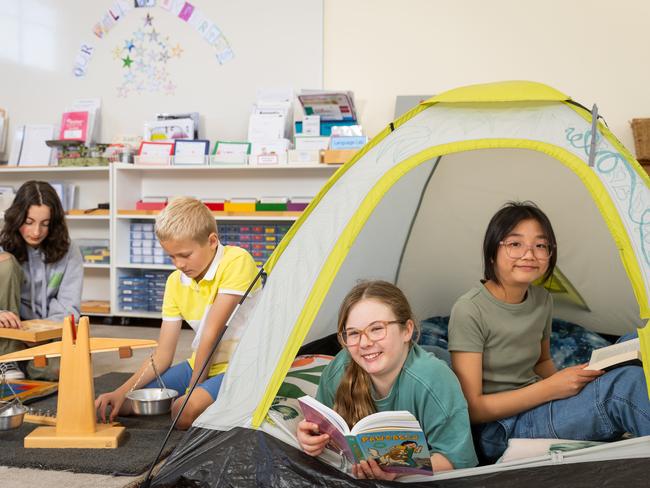
Dr Montessori was invited to create an early learning centre and established her “Casa dei Bambini” childcare in one of Rome’s poor, inner-city districts in 1907. It was here the Montessori philosophy was born.
The educator designed unique learning materials for her students after watching them engage with puzzles, prepare meals in the kitchen and take a hands-on approach to their schooling.
She found children absorbed knowledge from their surroundings and used the resources around them to teach themselves.
News of the school’s success sparked global interest, with her philosophy now used in at least 100 early learning centres and schools across the state.
While there’s a waitlist of up to five months at Melbourne Montessori College, Daniel said there were still misconceptions about Montessori education.
“(People ask) is it a cult? No, it’s not. Can students do what they want? No they can’t … We are guides, we help your child get from here to there. It’s preparing them for life opposed to an ATAR,” he said.
Other myths included there being no play in Montessori, it pushed children too far too fast and it was just for gifted students or those with special needs.
Daniel emphasised this was not the case.
“Montessori is for all children – children who are interested, children who are fascinated, children who love geography, children who love maths, children who love what children love. All children,” he said.
While mainstream schools have grades, Melbourne Montessori College refers to its year levels as “cycles” with each class accommodating for a range of ages.
Cycle one includes three and four-year-old kinder and prep-aged children, while cycle two caters for six to nine-year-olds.
“Maria Montessori believed children learn from each other, so the preps are the role models for the younger kids,” Daniel said.
“You often see them teaching the younger ones and that’s the best type of learning in regards to consolidating mastering.
“Sometimes our students are mature beyond their years because of the responsibility and with the expectations we have of them, they do incredible things.”
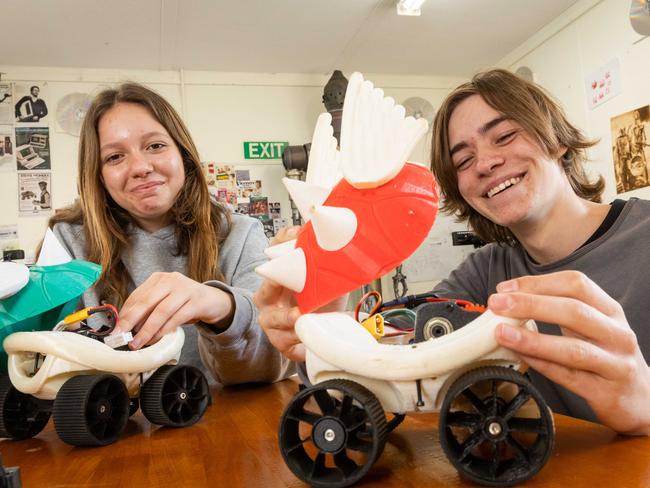
While the Montessori philosophy aims to give students independence, Melinda Kan, who teaches junior classes, said children are not solely left on their own to learn.
“We’re always observing and we offer them lessons … it’s so dynamic the curriculum,” she said.
“We have heaps to offer and do a lot of learning through storytelling, charts, and timelines to inspire the child,” she said.
“We support them by explicitly teaching the learning, how to use the materials to benefit and to gain experience, and then we observe. We give them freedom to choose, to follow up, and that’s how we support them to learn themselves.”
At the junior school, it’s standard for children to stay with the same teacher for three years.
This enables them to create strong teacher-student bonds and a deeper understanding of each other.
As for the curriculum, children learn maths, language, science, geography, history and practical life lessons during these early years.
Italian, performing arts and sports are also available with the support of specialists teachers.
When there’s conflict between students, Melinda said the teachers don’t “jump in and solve (the problem) for them”.
“We stand back and we watch. We see how they are solving it for themselves and then if they need support, we’ll step in and do mediation,” she said.
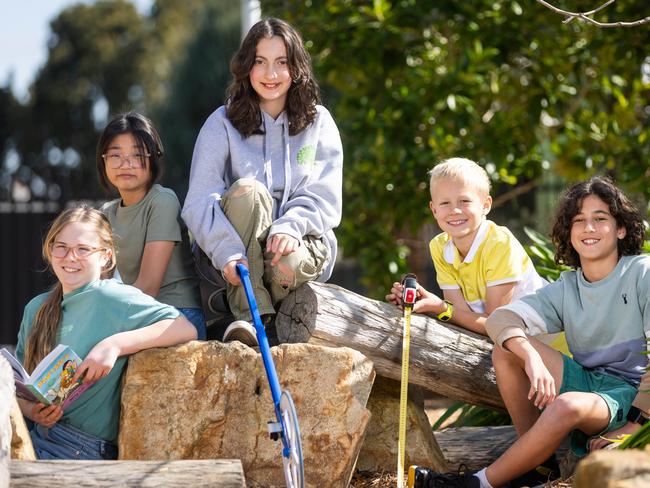
When determining the makeup of classes, teachers described the process as a “massive jigsaw puzzle”.
“We look at the makeup of the classes, the balance of ages, personalities, learning styles, friendship groups … we try create the best learning environment for each child,” Melinda said.
Meanwhile, the focus of cycle three extends beyond academic skills and prepares students for the transition to secondary education.
Melbourne Montessori College student Maverick, who is in cycle three, said he enjoys having the responsibility to take control of his learning.
“You have choices and the teachers give lessons to two or three of us, not the whole classroom,” he said.
“If you get something wrong, you can do it again and the teacher will help you.”
The 10-year-old aspires to be a real estate agent and stock investor when he finishes school.
At the senior level, school teacher Julian Ashton said the goal of Melbourne Montessori College’s adolescent program was to “empower young people to foster independence and agency in their learning”.
“In the adolescent space, we want to give (students) the time to explore, to try, to fail, to come back and try again,” he said.
“Learning is really for life. It’s not about grades, it’s about the bigger picture.”
The cycle four curriculum focuses on developing students’ critical thinking, information gathering, analysis, the ability to work independently and collaboratively and creative expression.
Then in cycle five, teachers prepare students for the two distinct pathways available in cycle six – the International Baccalaureate Diploma Programme and the Montessori Careers Program.
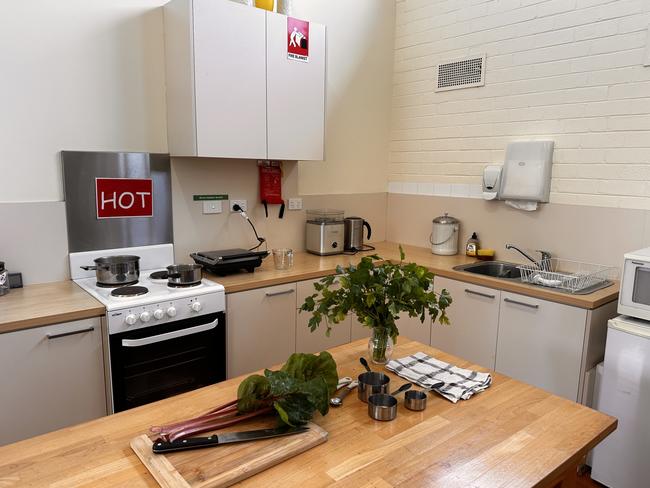
Julian said the relationship teachers shared with their students was “absolutely paramount” to their success at the school.
“If they can’t trust us to have their best interests at heart, we can’t give them the trust to make adult decisions,” he said.
“We don’t spoon feed, we don’t give students a how-to guide … they will navigate this plain by talking to their peers, getting experienced students to assist them or by watching YouTube.
“The aim is to not swoop in and solve all their problems, they need to solve it on their own because the results are so empowering for them”.
Cycle six student Raphael, 16, said the Montessori method allowed him to have ownership and take charge of his learning.
“My favourite thing about school is the teachers, especially in the International Baccalaureate program. They’re really invested in getting us to where we need to go and it’s almost like we’re friends,” he said.
“At lunch we’ll go down to the cafe and eat lunch together and I respect all of them.”
Melbourne Montessori College offers the International Baccalaureate – a specialised but academically-challenging diploma program offered to over 200,000 high school students globally.
In Victoria, it can be an alternative at some schools to the traditional VCE and VCE Vocational Major programs, with students receiving a diploma upon completion that’s recognised around the world.
“I love the opportunities it gives me. I feel like it’s preparing you really well for what’s to come later,” Raphael said.
Cycle four student Bal, 12, also has big plans for her future with the dream of opening up a restaurant in New York.
It was her passion for cooking that inspired this – a skill she gained from the Montessori classroom through its kitchen facilities.
“I really like how (the campus is) small so you know everyone. I know everyone’s names and they know mine. It’s a really nice community,” she said.
“I also like how our teachers guide us and not tell us what to do. Even in science you get to choose what experiments you’d like to do.”
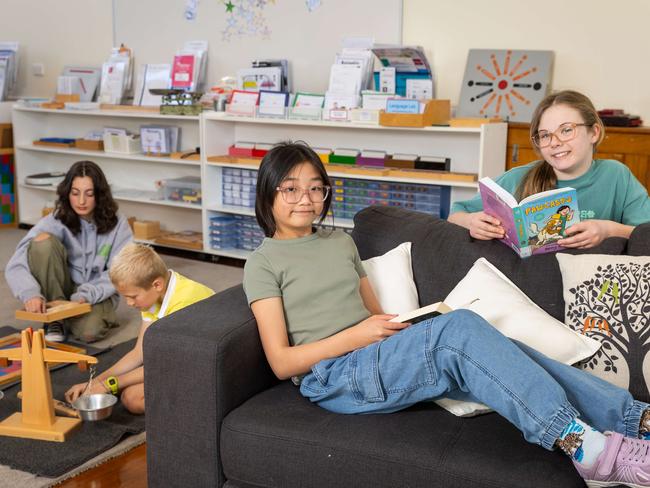
Students at both primary and senior levels also have meetings to discuss their concerns about the school, allowing them to have agency over their space.
“The interesting thing is they always end with acknowledgments and everybody goes around the room and recognises the value of somebody else in that space,” Julian said.
“The look on students’ faces when they get acknowledged, they just beam when they walk out of the room.
“It’s about giving them value … They’re all valuable, they all have an opinion, they all want to talk to an adult and want to be heard and seen.”
Parents are paying up to $24,400 per annum to send their child to Melbourne Montessori College, but they say it’s worth every cent.
“Parents have told us their kids feel part of something, they want to come to school and they know their child will be listened to and valued for who they are,” Daniel said.
“We’re raising real humans and preparing young people for life.”
For more information on Melbourne Montessori College’s Brighton and Caulfield campuses, visit the school’s website.





